Tale of two cities: home, sweet home, or a living nightmare?
Updated: 2015-01-14 14:53
By Liu Wei(chinadaily.com.cn)
|
||||||||
It looks, at first glance, like a common lower-tier city in northern China.
But if you look deeply enough you realize that Yanjiao – a small town on the edge of Hebei province – is under a strong influence from the west.
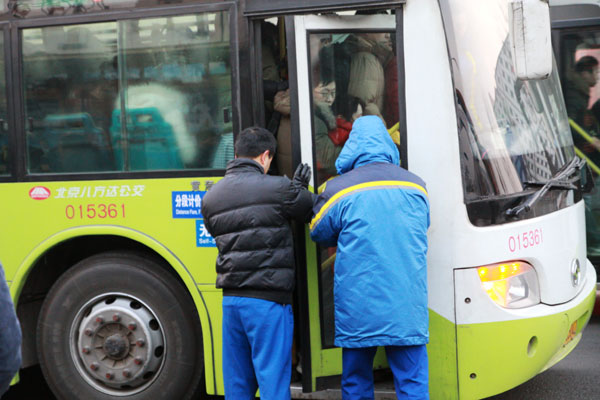 |
| Driver somehow manages to close the bus door even though the vehicle heading to downtown Beijing is packed to the brim, Jan 14. [Photo by Song Wei/chinadaily.com.cn] |
Every morning, tens of thousands of Yanjiao residents form long lines at bus stations and squeeze into overcrowded vehicles heading to the same destination: downtown Beijing. Curses are exchanged; sometimes skirmishes break out. But most passengers try to save their energy for the hour-long commute and the long day at work that follows.
Only 30 km from Tiananmen Square, Yanjiao is a small town. The nearest satellite town of the administrative region of the Chinese capital claims the title "city of beds". Roughly half its residents spend their days in Beijing, a city with the highest average housing price in the world's most populated nation.
Even the local government has no idea exactly how many people travel between Yanjiao and Beijing on a daily basis. Residents put the number at 300,000, while the local statistics bureau said the population of registered permanent residents is merely 246,000.
Lu Fei, a saleswoman at local real estate Banyan Tree Harbour, told China Daily there are almost 650,000 people living in the town.
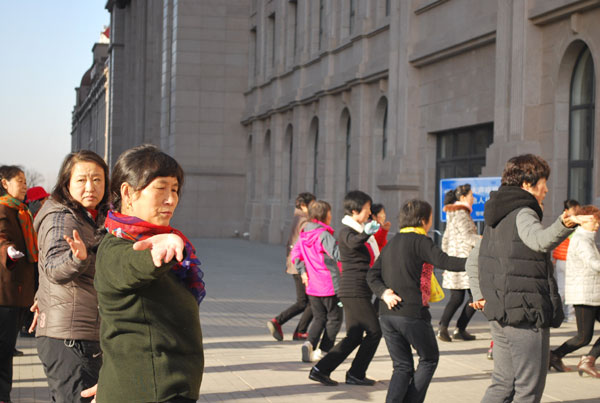 |
| Seniors indulge in dancing in Yanjiao, Jan 14. [Photo by Liu Wei/chinadaily.com.cn] |
Congested roads
Commuting is a headache for Yanjiao residents.
During the rush hour on weekdays, commuters experience frustrating traffic congestion and crammed buses.
"In a packed bus, just getting a place to stand is enough," said a commuter who takes the bus every day to work in Beijing.
Usually, commuters need to take the bus, train or carpooling to Beijing then use other methods to reach their offices. It usually takes one to three hours per trip. If the traffic is bad, it takes longer.
This means many of them need to get up at six or even five in the morning to be on time for work.
They are engaged in different jobs, vendors, costume designers, IT programmers, accountants and so on, but every day at a same point, they cram into their buses, suffer the crowd and the foul air.
The exhausting commute affects residents' lives considerably. Many choose to stay at home and catch some sleep on weekends as they hardly get any on workdays.
"I'm so sick of the terrible traffic here and will move to Beijing as soon as I can afford it," a 35-year-old accountant said.
"Most of people living in Yanjiao are those pushed out of Beijing. After all, Yanjiao is a compromise to them," said Lu, the saleswoman.
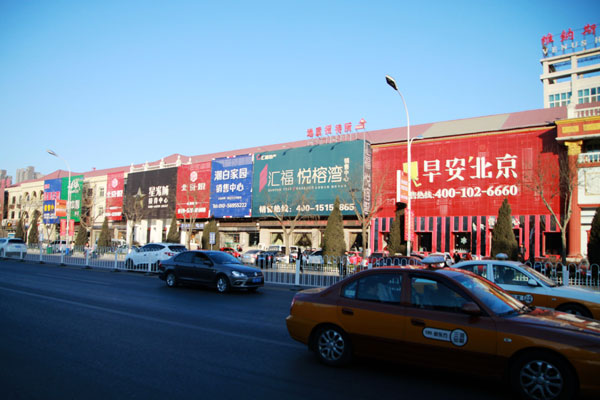 |
| Rows of shops sell real estate, on the national road No 102, the main road to enter Yanjiao, Jan 14. [Photo by Song Wei/chinadaily.com.cn] |
Cheaper to live
Urbanization is the cue for the town of Yanjiao to get on the stage.
People pour into cities such as Beijing and Shanghai, pushing the capacity of these mega urban areas to the limit. China's urbanization ratio rose from 17.9 percent in 1978 to 53.7 percent in 2013, according to a government report. The permanent urban resident population now exceeds 710 million.
With its low housing price Yanjiao was considered an acceptable plan B as a residential area for those working in Beijing but unable to afford a life there.
The housing price in the town has surged from about 4,000 yuan ($645) per square meter in 2008 to around 10,000 yuan on average.
"Back in 2008, people rushed to purchase bargain apartments as though they were free," said a resident who lived in Yanjiao for five years. "We also luckily grabbed one as it was cheaper."
Compared to the 40,000-yuan-per-square within the fourth ring road in Beijing, the price in Yanjiao is more reasonable for many families.
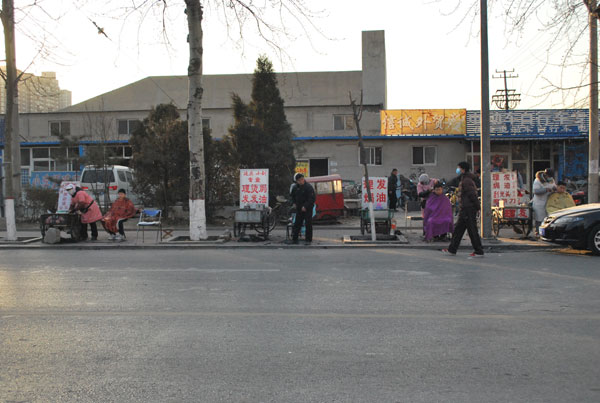 |
| People get their hair cut on the street in Yanjiao, Jan 14. [Photo by Liu Wei/chinadaily.com.cn] |
Fewer restrictions
Despite the problems however, many still call Yanjiao a sweet home.
Steven Schwankert, a former executive editor at True Run Media in downtown Beijing, has lived there for 18 months.
He described the place as "quiet and convenient" and praised the merits of living in a small place with fewer restrictions than that in big cities.
"In Yanjiao we are not bothered by a lot of the rules of Beijing, like dog size, or when you can use fireworks. There are some good restaurants around where I live, I have a lot of space, and no one bothers me there, and no one notices me. That's my kind of place," he said.
The surge in population has also attracted retail businesses to Yanjiao. A Wal-Mart chain store, shopping mall, a big supermarket and a wholesale home appliance store have all met the demands of residents. More public facilities including parks and recreation areas are also under construction.
"Life is comfortable here," said Zhang Ge, a man in his 30s who has a son and daughter.
"I plan to register my children in local schools. I moved here in 2010 and I like it," he said.
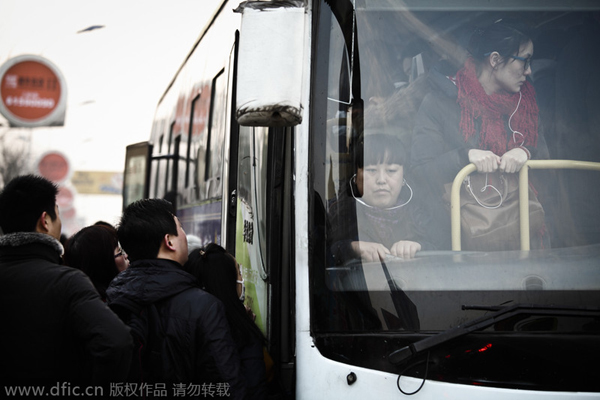 |
|
Passengers queue up to board an overcrowded bus to go to work in Beijing at a bus station in Yanjiao town, North China's Hebei province, Jan 12, 2014. [Photo/IC] |
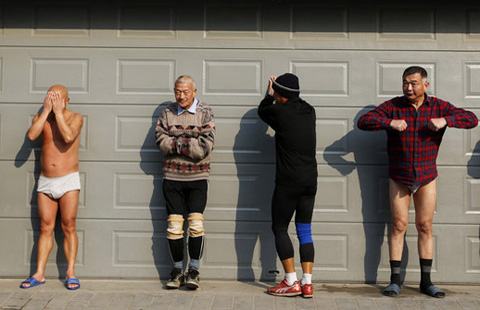
 Elderly swimmers see health benefits in freezing water
Elderly swimmers see health benefits in freezing water
 Girl uses nose to run online store
Girl uses nose to run online store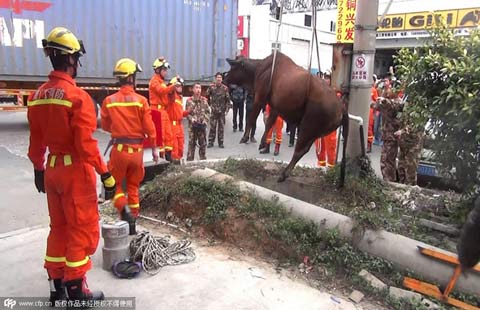
 Pregnant cow winched from well by crane
Pregnant cow winched from well by crane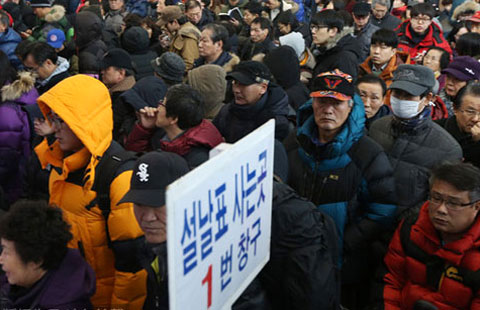
 Lunar New Year tickets run hot in South Korea
Lunar New Year tickets run hot in South Korea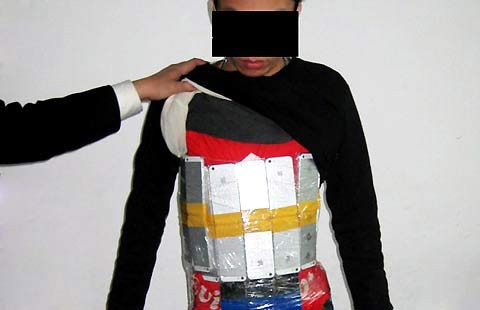
 Trending: Man straps 94 iPhones to his body
Trending: Man straps 94 iPhones to his body
 Time to become a woman
Time to become a woman
 The world in photos: Jan 5-11
The world in photos: Jan 5-11
 Belting out a tune for Beijing
Belting out a tune for Beijing
Most Viewed
Editor's Picks

|

|

|

|

|

|
Today's Top News
New book on China-US relations published
Li's oil company suspends production in Ohio
China, US holding joint drill in South China
Probe into deadly Washington subway smoke may take a year
China key cog for luxury Lincoln
US again gets most Chinese funding
Rail merger threatened by insider trading allegations
Suspect relieved to be home
US Weekly

|

|







